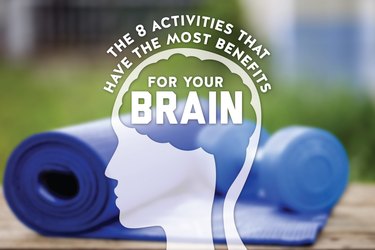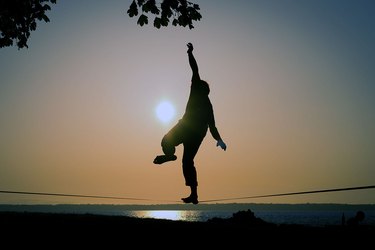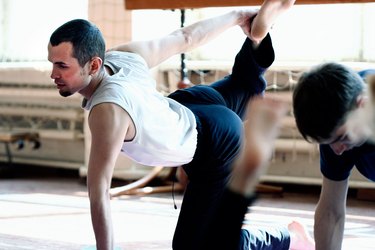
Crossword puzzles? Check.
Brain-friendly foods? Got 'em.
Video of the Day
But there is another key to staying mentally sharp: exercise.
Not surprisingly, exercise has been shown to be just as important for your brain as it is for your body.
"Activities — both cognitive and physical — are clearly protective for our brains," says Dr. Michael Harrington, Director of Neurosciences at Huntington Medical Research Institutes in Pasadena, California.
Being physically active increases the brain's blood supply, protects against mental decline and neurodegenerative diseases and encourages the growth and development of new neurons, among other benefits.
And it doesn't take much. A study from theUniversity of Georgiafound that just 20 minutes of exercise a day can improve the brain's information-processing and memory functions. So, what are you waiting for?
1. Ballroom Dancing
Your foxtrot and tango may have brain benefits beyond the dance floor.
According to an academic paper inFrontiers in Aging Neuroscience, participants in a weekly, hour-long dance class were found to have "significant improvements of performance…in cognition/attention (memory, visuospatial ability, language and attention), reaction times, sensory-motor performance, posture and lifestyle" after six months in the class.
Another study in theNew England Journal of Medicinefound that dance was the only physical activity out of 12 studies that lowered participants' risk of dementia_._
Dancing is so beneficial because it not only requires remembering specific movements, coordinating with a partner and spatial awareness, but it also integrates music and social interaction — both of which have been shown to benefit the brain on their own.
2. Balanced-Based Exercises
From BOSU balls to slacklines, balance beams to wobble boards, exercises that challenge your sense of balance and force you to focus can lead to better brain health. Giselle Petzinger, M.D., an assistant professor of clinical neurology at Keck Medicine of USC says these kinds of cognitive engagement exercises "force you to learn new skills and control your body in space. This improves your motor skills and the circuitry within your brain."
This can carry over into different aspects of your life.
“Paddleboarding,例如,cogniti是伟大的ve engagement since it is a skill-based exercise. You are constantly challenged as you try to balance and propel yourself in a certain direction." Your center of gravity is largely governed by your cerebellum, an area at the base of the brain that also assists with motor control and coordination. Recentresearchshows that the cerebellum also plays an important role in cognitive processing and emotional control.
3. Yoga
If you are one of the20.4 million Americanswho practice yoga, you can add cognitive benefits to the list of reasons to love your downward dog.
Beyond decreasing stress, anxiety and back pain, aliterature reviewon the impact of yoga on brain waves found that yoga caused increases in the brain's gray matter — where most of the brain's neurons are.
It's also the part involved with tasks like muscle control, sensory perception, memory and decision-making — allowing the yoga practice toprotect the brainfrom some age-related cognitive declines.
Yoga also was found to increase activity in the amygdala, which controls your emotions and motivation, as well as the frontal cortex, which controls motor function, problem-solving, spontaneity, memory, language, initiation and judgment.
Talk about enlightenment!
4. Running
Whether you're a daily walker or weekend runner, pounding the pavement will boost your brainpower as well as your body.
"When you engage in cardiovascular activities, such as running or biking, it increases blood flow to the brain and improves trophic factors, creating an environment that allows the brain to perform efficiently," says Petzinger.
Astudypublished in the journal Brain also found that running increases the number and complexity of the nerve cells that receive and transmit messages to the cell, decreases inflammation in nerve tissue and elevates the level of certain important brain-derived proteins.
The study suggests that while mild to moderate levels of running could preserve cognitive functions, moderate to high-intensity training may even have the ability to improve the brain.
5. Sex
Can a roll in the hay make you smarter?
Perhaps.
Onestudyout of the University of Maryland found that regular sexual activity improved cognitive function and even created new neurons in the brain, whileotherresearch has found that adults with active sex lives had better memory recall.
Findings fromBarry R. Komisaruk, Ph.D., of the Department of Psychology at Rutgers, found that, for women, an orgasm activates multiple areas of the brain at once, making that "Big O" so much more beneficial for your brain than that crossword puzzle.
6. Tai Chi
Once a Chinese martial art form for self-defense, tai chi is now promoted as a low-impact exercise option that relies on a series of slow, controlled, fluid movements that challenge the body and mind.
In addition to improving balance, stability and mood, research suggests that tai chi can boost your executive functions, an umbrella term for cognitive abilities such as planning, working memory, attention, problem-solving, verbal reasoning and task switching.
Its combination of mild aerobic activity and agility, along with choreographed movements and coordinating those movements with the breath, impact multiple parts of the brain at the same time.
A2014 studysupported by the National Center for Complementary and Integrative Health found that regularly practicing tai chi even offers brain benefits for those who show mild cognitive impairment to dementia.
7. Weightlifting
Here's another reason to figure out the weight room at your gym: Astudypublished in the Archives of Internal Medicine found that six months of twice-weekly resistance training for participants with some cognitive decline enhanced their attention, memory and brain plasticity compared with people who just performed balance and toning exercises.
Interestingly, those with no prior cognitive decline took12 monthsof biweekly weights to see results, suggesting that resistance training offers mental benefits more quickly for those already seeing some signs of mental decline.
Anotherliterature reviewout of the University of New Mexico confirmed the same brain bonuses as well lessening depression, anxiety and chronic fatigue. Choose from free weights, weight machines or body-weight suspension-training exercises like TRX to boost your brainpower.
8. Breathing Exercises
While breathing exercises like those found in meditation and qigong are pretty low on the strenuous physical activity scale, they have shown to have a variety of positive impacts on the brain.
The benefits are threefold: Meditation works to decrease stress and anxiety (which can negatively impact the brain), stall age-related cognitive declines and improve other brain functions.
A study out ofHarvardfound that mindfulness mediation can actually increase the thickness of the hippocampus, which controls your memory and learning, whileanotherdiscovered that practitioners of Vihangam yoga meditation preformed better on a wide range of cognitive tests compared to non-meditators.
Otherresearchpublished by the National Institute of Health found that meditation may slow or even reverse age-related changes that normally occur in the brain and that meditators had more brain folds than non-meditators, which may increase the brain's ability to process information.
So while you might not break a sweat with your Om-time, know that your brain is getting a major boost.
What Do YOU Think?
Do you do any of these activities? Have you noticed any of the benefits for your brain? Any other activities we should add to the list? Tell us in the comments below!







